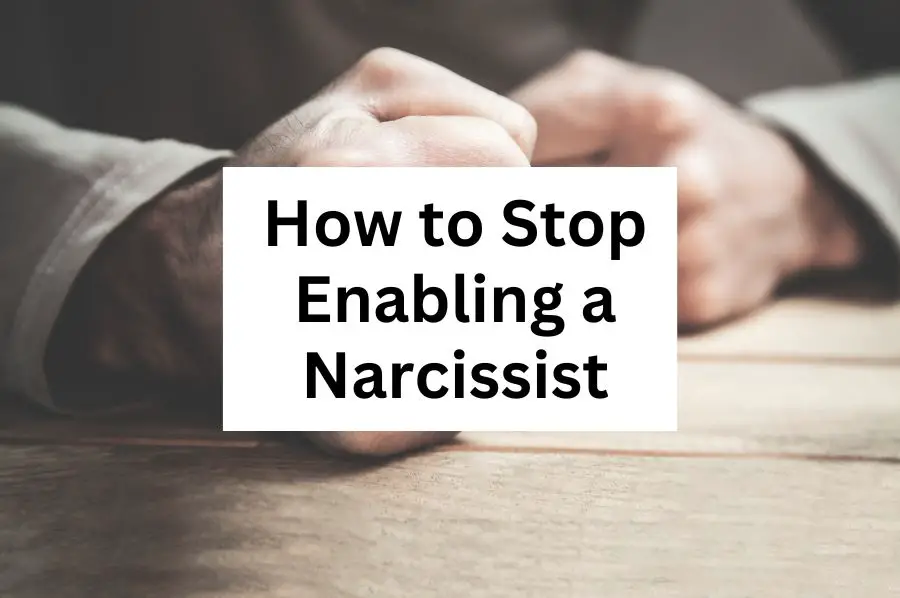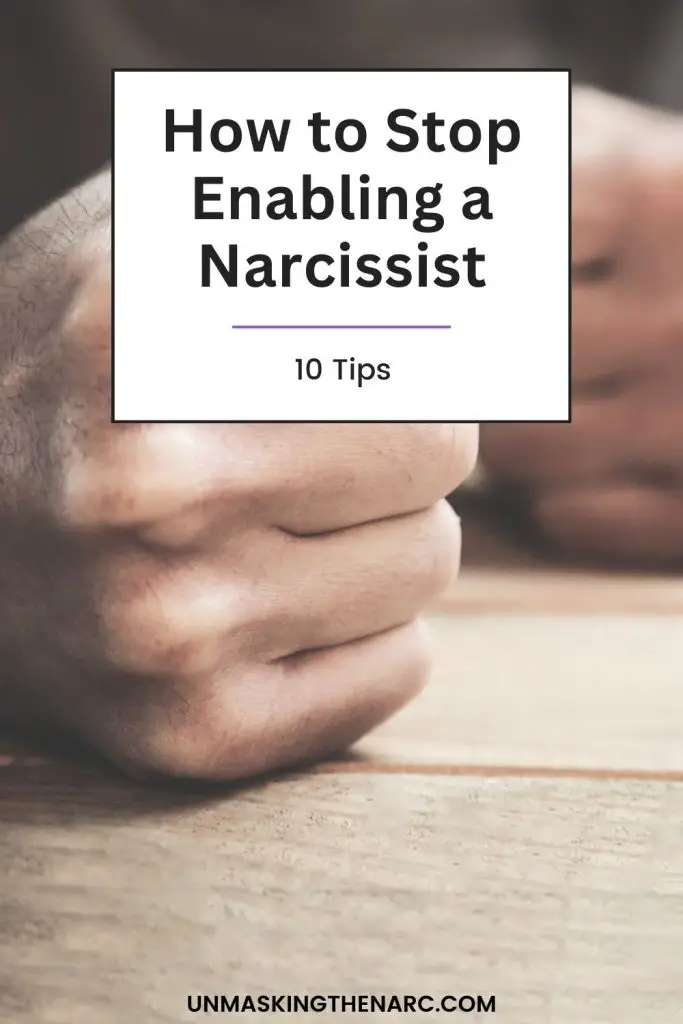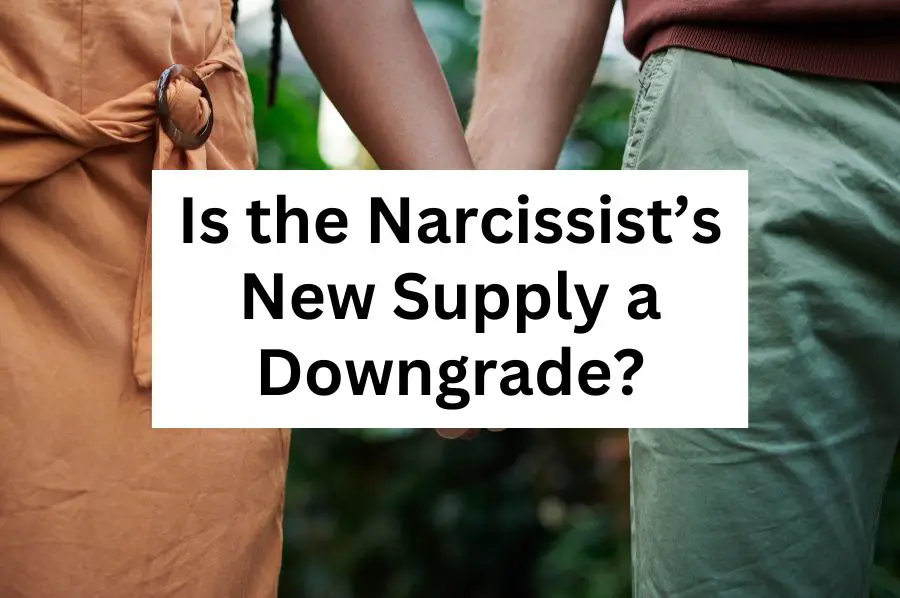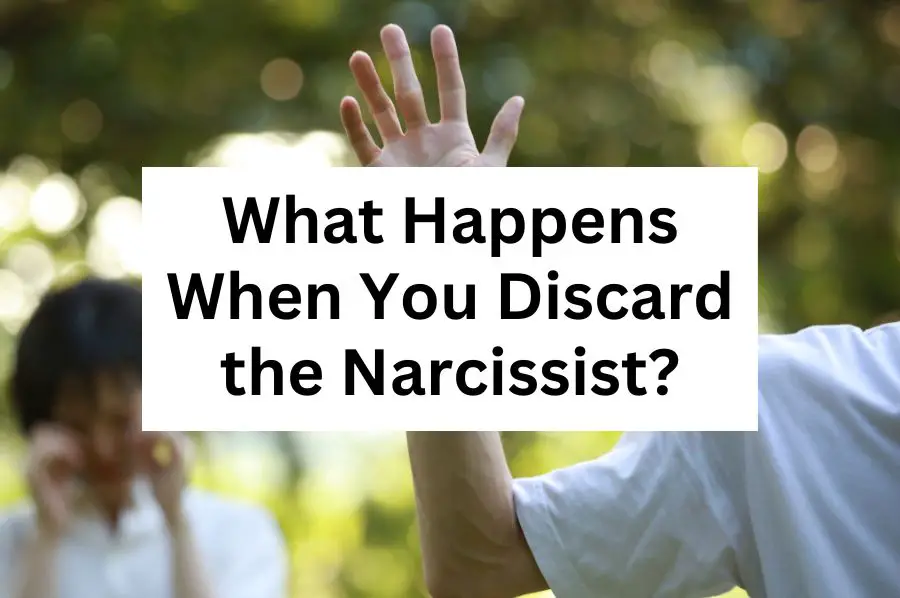In order for narcissists to continue getting away with their abusive behaviour, people must continue to allow it.
The biggest tip on how to stop enabling a narcissist is to simply no longer accept their disrespectful treatment.
That’s much easier said than done, I know!
Nonetheless, while we keep granting the narcissist the space to be insulting, cruel and manipulative, they will continue to treat us that way.
Narcissists don’t see anything wrong with their behaviour and they rarely (if ever) suffer any consequences for it. So, why would they stop? They’re quite happy shouldering their way through life, dishing out orders and getting whatever they want.
However, it’s us who feel the consequences of their wrath and it’s us who are left to clean up their mess.
The narcissist will never be forced to take any responsibility for their actions if no one ever holds them to account.
I know how hard this journey is, I spent most of my first 35 years as an enabler. First, being raised by a narcissistic parent, then continuing that path with a narcissistic husband, I was well-primed to over-give and wear the narcissist’s crap, without so much as a thanks.
But as an evolving, responsible adult, I finally got to the point where I could no longer bear the ill-treatment any longer. It was time to be strong and get myself out of the narc’s tangled web.
Throughout that process and during the aftermath (oh yes… there was an aftermath!), I had to acknowledge my part in the play as an enabler. I wanted to grow into a better person, and I no longer wanted to accept such poor treatment from anyone ever again!
Personal growth involves setting firm boundaries and no longer taking responsibility for those who do not wish to take responsibility for themselves. That’s where true freedom is at.
Please understand that by discontinuing the enabling of narcissistic behaviour, doesn’t in any way mean that the narcissist will change. They won’t.
This is about you putting an end to your self-abandoning patterns in order to keep the peace and survive. It’s now time to honour yourself and give yourself all of the things that no narcissist will ever have the capacity to provide or even care about.
So, let’s explore in detail how we stop enabling narcissistic behaviour in others.
This post contains affiliate links, for more information, see our disclosures here.
What is an Enabler?

When you think about how ridiculous the behaviour and demands of a narcissist are, it makes you wonder… how do they actually get through life this way?
Well, you can bet your bottom dollar that a narcissist would not make it very far without people enabling their ludicrous ways.
People who are enabling a narcissist not only play along, but actively back their over-inflated sense of self, entitlement and controlling behaviours.
How people enable narcissists:
- Accepting mental, verbal and/ or physical abuse (too afraid to stand up for themselves)
- Hiding the narcissist’s abuse
- Justifying the narcissist’s abuse to themselves and others
- Accepting the narcissist’s non-apologies
- Blaming themselves and situations for the narcissist’s behaviour
- Accepting the narcissist’s version of events
However, we can’t throw all of the blame at enablers as they are quite often the biggest victims of the narcissist’s abuse. Over time the enabler has learned that for their own personal safety, appeasing the narcissist is often their best bet.
Throughout any narc relationship (whether it be a parent/ child, intimate partner, coworker/ boss or friend), the narcissist has eroded the enablers self-worth incredibly. The enabler’s view is warped in its own right due to the narcissist’s gaslighting, invalidations and manipulations.
The trauma bond, which was implemented by the narcissist slowly throughout the relationship, keeps the enabler loyal to them, in order to have their atrocious behaviours enabled.
The enabler is often living from a place of survival and just trying to have their own needs met. Whether that be security (home, food, money), approval (needing acceptance from the narc), family/ workplace stability and so on.
| READ: The 7 Trauma Bond Stages → |
What Kind of Person Enables a Narcissist?
The kind of person who enables a narcissist is generally someone who has weak boundaries and high levels of compassion. Narcissists love compassionate people, as they’re so much easier to manipulate.
No one ever wakes up one morning and thinks, “I’m going to be an enabler!” It happens slowly & subtly over time.
Narcissists are well-versed in playing on the empathy of others and creating a sense of guilt within them. Enablers are easily persuaded to the narc’s viewpoint (agenda) through coercive false truths, because they feel compassion and/ or loyalty towards the narcissist.
Oftentimes, enablers are people who are afraid of the narcissist and what they might say or do if they don’t comply. The enabler has been programmed by the narcissist to fear their outbursts, punishments, silent treatment and other repercussions when the narc doesn’t get their own way.
Narcissist enablers can be a…
- Parent
- Child
- Sibling
- Friend
- Romantic partner
- Coworker/ Boss etc.
Compassion vs. Enabling

What’s the difference between having compassion for someone versus merely enabling their behaviour.
Compassion:
- A strong feeling of sympathy and sadness for the suffering or bad luck of others and a wish to help them (Cambridge Dictionary).
Enable:
- To make able; to make possible or easy; give power, means, competence or ability to (dictionary.com).
Looking at the definitions above, you can see how having compassion for someone is about recognising that person’s suffering and genuinely feeling for them. It’s an emotion of the heart.
Whereas, enabling someone is about using your ability or means to make something possible for them. In the sense of enabling a narcissist, you’re handing your power away and making things easier for them so that they get to prop up their false storyline and not have to take responsibility for themselves.
When you have compassion for someone or their situation, you want to help in one of two ways:
- You offer your resources to help in ways in which they can’t help themselves
- You offer to work with them and assist them where you can, as a team
When you are enabling someone, you are doing for them that which they can do themselves but are choosing not to.
Is Enabling a Form of Abuse?
I don’t believe enabling is a direct form of abuse, however, enablers effectively become an accomplice to the abuse because they support the behaviour and allow it to happen.
Essentially, when someone enables another person’s toxic behaviour, they rob them of the ability to be responsible for themselves.
When the narcissist is verbally abusive towards you, if you don’t walk away or show them that you won’t tolerate their abuse, then you enable it.
If the narcissist plays the ‘poor me’ card, when they were the ones to have created the drama in the first place, you enable them by accepting their version of events without question.
What Causes Someone to Become an Enabler?

Enabling is quite often a learned behaviour, which stems from childhood. Due to a trauma or household circumstance, enablers felt like they were not enough or weren’t loveable unless they were over-extending themselves to others.
Enablers crave being needed, because it validates their worthiness. They feel like the only way people will like them or love them is if they’re forever giving and doing for others.
What enablers haven’t yet learned is that by continuing to seek love, validation and approval outside of themselves, they continue to put that power into someone else’s hands.
Anyone who is a whole being has the capacity to connect to the divine connection of all that is and generate their own self-love, self-approval and self-worth from within.
Narcissists are a fractured self, meaning they do not have the resources to tap into that unlimited supply of inner unconditional love and approval.
That is why they seek to steal it from others outside of themselves, in the form of attention, admiration and by creating chaos to ignite people’s highly-charged emotions. All of these things hand over your precious life force energy to the narcissist.
Do Enablers Realise What They’re Doing?
The behaviour of the narcissist becomes so ‘normalised’ over time, especially if the enabler has grown up around abusive, narcissistic or toxic patterns.
Due to the nature of an enabler, they’ll quite happily put themselves last in order to make sure everyone else is happy. It’s so familiar that it’s their place of comfort.
However, if they’re honest with themselves, there is an element inside that’s saying, “This isn’t right,” when enabling a narcissist. It doesn’t feel good, it simply feels like the best case scenario for survival.
But due to low self-worth and a lack of being their own source of love, approval and security, they believe that their very survival is hinged on appeasing the narcissist. If they don’t, they’ll be left with nowhere to live, no money to feed themselves, no job, no support, no family and so on.
Common things enablers think:
- “Every relationship is like this.”
- “If I hadn’t have poked the bear, this could have been avoided.”
- “If I were more attractive, they’d probably be more affectionate.”
- “They don’t mean to do that, they’ve just had a bad day.”
- “If I were more competent, they would leave me alone.”
- “Their temper will subside once we get through these hard times.”
- “I know they love me, they just have a hard time showing it.”
The primal fears of survival and security are all triggered within the enabler, which is exactly what the narcissist has played on all along. That’s how the narcissist managed to go from a ‘lovely’ or ‘charming’ person in the beginning to someone who can so easily control the puppet strings down the line.
Quite often, enabling behaviours are so deeply entrenched that it can play out in unconscious actions. Enablers don’t always realise what they’re doing until they are able to consciously recognise their own patterns and address them.
| READ: Full Cycle of Narcissistic Abuse → |

How to Stop Enabling a Narcissist

If you have found yourself in a situation where you are an enabler of toxic behaviour, it’s okay. I was too for many, many years. It was a matter of survival and low-self worth on my part.
However, I was able to identify my share in the behaviour and realise that I’m worth so much more than being someone else’s pawn. I escaped my narcissist husband and proved to myself that I never needed him in the first place – he was always the one who needed me!
Once you become your own source of love, validation and security, there is nothing the narcissist can hold over you any more. No longer will you feel like you need to put up with their abusive ways because trust me, you really do not need them.
Below are a range of ways on how to stop enabling a narcissist, whether it be a partner (or ex), family member, friend or co-worker.
No longer do you need to shoulder the responsibility of someone who refuses to take accountability for themselves.
Go No/ Low Contact if Need Be
First and foremost, if you do not need to have the narcissist in your life, I highly recommend going ‘no contact’ with them. If you’re looking at how to stop enabling a narcissist, the most firm way is to walk away and simply not allow their abuse to be present in your world.
However, I know that for many reasons, narcissists will still be in some of our lives. Maybe they’re a parent, sibling or child of yours. It could be that the narcissist is your boss or coworker, so going no contact is simply not an option.
In those cases, your next option is to go ‘low contact.’ This is essentially where you have as little to do with the narcissist as possible. Keep communication to a minimum and only discuss the facts around what you need to discuss with them.
Low contact works well for ex partners who you’ve got children with. Avoid getting caught up in idle chit-chat, which they will often use as a way of gathering information about your life. It may seem harmless in the moment, but I can tell you from experience that many of those ‘innocent’ conversations can come back to bite you later on.
Stick to the facts about the kids with the shortest word count possible. Apps like Our Family Wizard are a great way to communicate with a difficult ex partner, because it keeps everything recorded and both parties 100% accountable.
You can go low contact with a narcissistic family member, but you’ll need to set some firm boundaries to keep your own mental health in a good, happy space. More on that below.
Identify the Narcissist’s Deal Breaker Behaviour

It’s important to actually identify which behaviours of the narcissist you will no longer tolerate. What things do they consistently say or do to invalidate you, make you feel uncomfortable or be outright disrespectful?
Think about all of the different things the narcissist has done over the years, which have left you feeling awful in one way or another. Use those examples to pinpoint the particular behaviour that you are choosing to no longer allow in your life.
Examples of deal breaker behaviour:
- Verbal abuse
- Name-calling
- Belittling comments
- Blame-shifting
- Inconsistency with communication
- Selfish behaviour – not being reciprocal
- Rageful outbursts & projecting their own problems onto others
| READ: How Narcs Blame Shift → |
Set Healthy Boundaries
Now that you’ve identified your deal breaker behaviour, it’s time to set some boundaries. When we set healthy boundaries, we teach other people how to treat us.
If your narcissistic father continues to yell at you or belittle you every time you go to visit him, you need to ‘teach’ him that you no longer accept that behaviour. Let him know that if he continues to talk to you in that way, you’ll leave. Then when he talks to you poorly again (and he will), you need to pick up your bag and walk out that door.
Boundary violations must be backed up with consequences, otherwise you’ll lose credibility.
If you’ve got a narcissistic friend who only ever messages you to talk about herself, yet never asks or shows any interest in your world, it’s time to set a boundary. You may choose to just ignore her messages and not respond to the self-absorption. If you’re happy to not have her in your life anymore, then so be it. However, if you do want to try and maintain some level of friendship, then you need to speak your truth and let her know that if the conversations continue to be one-sided, you’re out.
For someone who’s always made sure everyone else is happy (people-pleasing, enabling and self-sacrificing), setting boundaries will feel uncomfortable – at first!
Initially, you’ll probably feel guilty as hell for saying, “No thanks” to people who’ve come to always expect a, “Yeah sure.” On top of that, other people will not like these new boundaries being placed in front of them. They’re used to being able to push you around or massage your perspective to get their own needs met.
The fact is, if you don’t respect your own needs, no one else is going to either. It’s your job to teach people how to treat you.
The most important thing is that you are confident within yourself around your boundaries and you continue to stand firm with them. Narcissists do not like boundaries. Quite frankly, they don’t think boundaries apply to them, so they will try to railroad right through them.
As long as you know your own truth (despite what rubbish they try to manipulate you with) and follow through on your actions each and every time, they’ll soon get the picture.
| READ: How to Respond to a Narc’s Text → |
Stop Doing So Much for Them

Just like we train someone how to treat us positively, we also train people how to treat us in a negative sense.
When we continue to clean up all of the narcissist’s messes, we teach them that there are no consequences for their abusive behaviour. They learn and expect that someone else will always pick up the pieces so that they don’t have to do it themselves.
This can be in the physical sense, as well as in other aspects of our lives.
I know this one all too well myself. My ex narc figured out pretty early on in the relationship that I can’t stand mess and clutter. So, we would quite literally throw things in his temper tantrums, then just leave them there for me to pick up, knowing full well that I would.
The narcissist’s messes can also be financially related. They are famously known for racking up debt on credit cards, because their insatiable need to have the newest, shiniest and best is a void that never seems to be filled. Their False Self dictates to them that they must look the best at all times, in order to receive attention and admiration. All of this equates to narcissistic supply.
The problem with the narcissist’s overspending is that it can affect entire relationships and families in catastrophic ways. The narcissist will then turn around and say they can’t afford to pitch in around the house because, “I’ve got a new car to pay for you know!” – as though, how dare you ask for help. Or they may even have convinced you to take on the debt in your name, then they’ll shoot through, leaving you to pay it off!
How to stop enabling a narcissist in a huge way is to stop doing for them that which they should be doing for themselves.
Through all of these examples, the narcissist gets to have whatever they want without any repercussions. It’s up to you to feed, clothe and house the family, while the narc gets to ride around in a fancy new car. Or it’s up to you to pay off the money, spent via their lavish lifestyle, leaving you nothing to show for it but stress and worry.
Another example of enabling the narcissist is by doing too much for them in the physical sense. It could be jumping up to get them a drink when they demand it, or running out to the shops for them, every time they think of something they want.
The number of ways we do too much for narcissists is endless.
| READ: When You Figure Out the Narc → |
You are Not Responsible for the Narcissist
Throughout the narcissist’s manipulations, gas lighting, blame-shifting and silent treatments, enablers unconsciously learn to take on the narcissist’s responsibilities as their own.
If there’s one thing that defines a narc, it’s that they outright refuse to take responsibility for their own behaviour. Even if they act horrendously… it’s your fault that they did it. Nothing can ever be their fault.
So, to avoid being blamed, raged at and projected upon, enablers will try to anticipate the narcissist’s next move and do whatever is in their power to avoid it from happening. That can range from placating the narc when they see them getting agitated, to telling the narcissist, “Not to worry,” when the narc causes chaos. The enabler will actively go and fix the problem on behalf of the narcissist all in the hopes of avoiding any backlash.
Once you leave the narcissist, it can be a process to rewire your patterning and recognise that they are not and never were your responsibility.
The narcissist is a grown ass adult who needs to take responsibility for every single word, thought and action of their own. And if they choose not to be responsible (which we know they won’t), well any kick-backs and consequences must also fall onto them.
You are not responsible for their shitty behaviour or disrespectful words. You are not responsible for any backlash that comes the narcissist’s way on account of their own actions. You do not have to clean up their mess, take on their debt or try to reduce the consequences the narc may have found themselves dealing with.
On a more personal scale, you are not responsible for the narcissist’s anger outbursts, regardless of what’s happened. And you are certainly not responsible for all of the things that they’ve done, then shifted back onto you and blamed you for.
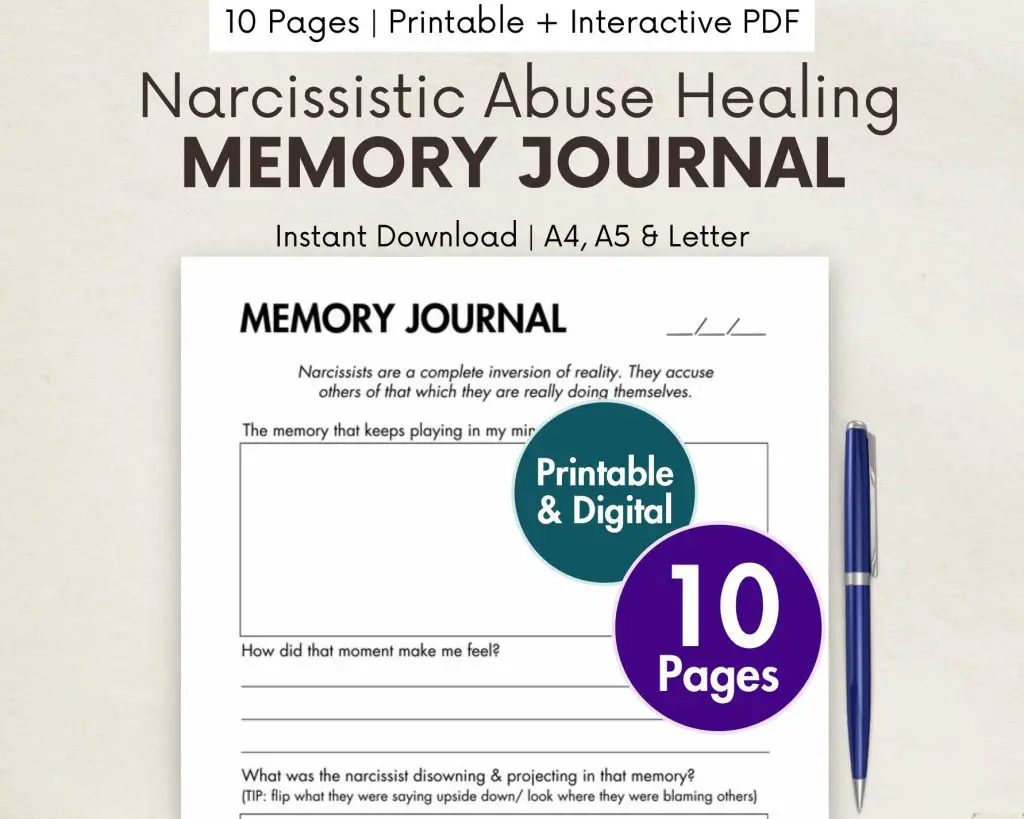
Memory Journal
Release the painful memories once and for all!
- Journal recurring thoughts
- Sort through what’s yours vs. theirs
- Identify your inner wounds to heal
- Return the narcissist’s disowned wounding
- Step-by-step guidance
- PRINTABLE & DIGITAL
Don’t Play into the Narcissist’s Pity Parties

Narcissists are the biggest victims getting around, especially covert narcs! They are always the poor, hard done by ones, no matter what the circumstance.
They can lie, cheat, steal, invalidate, abuse and still be the poor person, who’s just had all of this bad stuff happen to them, as if it all appeared out of nowhere.
We’ve already established that they lack the resources or motivation to take responsibility for themselves in any way and their pity parties are an extension of that. They are so good at twisting up the storyline, that they genuinely cannot pair up their actions with the consequences.
They’ll claim that their marriage fell apart because of the other person ‘being difficult,’ rather than owning that it was due to their abuse. Poor them!
They will play the ‘poor me’ card when gaining weight from their unhealthy lifestyle… but it’s their partner’s cooking that’s “Made them fat.” They will completely disown the fact that they go back for third helpings, buy take-out for lunch every day, live on soft drinks and don’t do any exercise.
They’ll play the victim of their financial woes, yet they’ll continue to live beyond their means. They will actively avoid sitting down to work out a budget because they refuse to take responsibility for their incomings and outgoings. But, instead of taking charge and being financially responsible, they’ll be the poor, hapless victim for always being broke.
Another common narcissistic pity party is when they create drama with other people (at work or with friends/ family), then smear the other person as they public cry out about how victimised they’ve been.
All of these examples and the hundred others that you could add to the mix, are all about the narcissist playing the victim at the hands of someone or something else.
Nothing is ever their fault, meaning they evade accountability every, single time.
So, how to stop enabling a narcissist is to not buy into their ‘poor me’ dramas and instead, simply observe them from the outside. Over time and with much practice, you’ll surprise yourself at how much you are able to step back and not be a part of their tangled web any more.
| READ: Why a Narcissist REALLY Cries → |
Detach from their Behaviour
Following on from not buying into the narcissist’s drama is the art of detachment.
The biggest piece of intel I can give you here is that the things the narcissist says and does are actually not about you. I know they can make it feel extremely personal, especially when they open up a painful inner wound of yours. But, as with everything in the narc’s world, it’s all about them.
Everything the narcissist does is to gain attention so that they can inflate their ego and get their next hit of narcissistic supply. They need to incite such huge reactions in others, just so that they can feel alive and powerful.
The narcissist’s world is not your world and the things that spew out of their mouths are a reflection of themselves… no one else.
Once you can get to the point where you are no longer triggered into reacting to the narcissist, then you can fully detach knowing that it’s just who they are.
That doesn’t mean that you’re granting their behaviour as acceptable, but that is how to stop enabling a narcissist in an effective way.
You are then able to step back, observe with mild interest and not feel that pull to be drawn into their chaotic whirlwind.
Don’t Defend Yourself to the Narcissist

Narcissists are masterful at getting people to question themselves. They love pushing people into a corner and making them feel like they need to justify or defend themselves.
Let’s just get this straight, right now – you do not need to defend your actions, words or boundaries to anyone, let alone an invasive narcissist.
Having a few ready-made responses up your sleeve is a good way to deflect narcissistic comments and accusations where they aim to put you on the defensive.
- “You’re entitled to your opinion, just as I am entitled to my own.”
- “Thanks for sharing your concerns.”
- “That’s my personal business.”
- “I’m confident with my decision.”
- “I’m late, I’m going now.”
- “I don’t need to discuss this with you.”
- “We can agree to disagree.”
Respond, Don’t React
The difference between responding to narcissist versus reacting to a narcissist will give you two very different outcomes.
Responding – is responsible, considerate and deliberate action.
Reacting – is to meet one immediate action with another impulsive action.
How to stop enabling a narcissist is to avoid reacting, because that’s exactly what they want.
A narcissist will push and push until you explode, then turn around and say, “You’re crazy. I was just trying to be the reasonable one.”
They love this! Not only do you hand over loads of your precious life force energy in these wild reactions, but it also makes the narcissist feel incredibly powerful.
“I must be pretty impressive to be able to induce that level of a reaction of out of them.”
The best way to respond to a narcissist is with closed responses, which serve to close the conversation off from further engagement. You can put the onus back onto them by not even entering their manipulative dynamic.
Ways to politely end a conversation with a narcissist:
- “I’m sorry you feel that way.”
- “I’ll keep that in mind, thanks.”
- “I’m off to get ready for work now.”
- “Your feelings/ reactions are not my responsibility.”
- “Well, have fun on the weekend.”
- “Let’s catch up another time.”
- “Sorry to cut things short, but I’ve got to head off.”
- “I’ll let you get back to what you were doing.”
Remove your attention from the narcissist and onto something else (kids and pets are a great distraction here).
Choose Yourself

Ultimately, if you’ve been hanging out with a narcissist, you’ve probably let yourself fade away in order to put them first.
I totally get it, it was a matter of survival. And to be honest, you probably weren’t even aware of the slow decent until after the fact. That’s usually the way in abusive situations.
My best personal tip on how to stop enabling a narcissist is to actually choose you. Your days are done where the narcissist gets to be the centre of all things through their demands, invalidations and manipulations.
Sure, they’re not going to like it when you choose yourself, because that means you’re actively choosing to not have them as the centre of your universe. But, that’s the beautiful thing about not enabling a narcissist, they are not your responsibility any more.
By choosing yourself, you are taking full responsibility for your own personal growth and soul development.
What choosing yourself looks like:
- Self-care
- Learning to love yourself unconditionally
- Being your own source of acceptance, validation and security
- Healing your inner wounds
- Being free to walk forward in life as a sovereign being
Self-care should be a hugely important aspect of our daily lives, yet when we’re involved with narcissists, self-care doesn’t even rate. There’s no time for looking after yourself when your self-worth is so low and all of your energy is being directed towards them.
The narcissist has spent the entire relationship draining you of your life force energy, while your energy gauge became more and more depleted. How the narc was able to access your vital energy was by putting the crosshairs on your inner wounding and triggering you.
They used your insecurities and traumas against you in order to gain attention and validation for themselves, all while squashing you down in the process.
Now it’s time to regain your strength and heal your traumas so that no narcissist can ever have anything to trigger you with again.
The best way that I’ve found to actually shift and heal my own inner wounds was through metaphysical healing, as it works on an energetic level, beyond that which our minds can achieve (see below).
It’s time to be your own source of love, approval, security and validation so that no longer can anyone hold your keys in their hands.
I hope this article has helped with your quest on how to stop enabling a narcissist, as it can be a tough old pattern to break.

Energetic Healing from
Narcissistic Abuse
If you’ve tried everything to heal but still can’t shift things, it might be time to call in the spiritual realm.
✭ Removal of stuck energy
✭ Removal of old traumas & memories
✭ Past Life Regression
✭ Understanding your journey & how it’s shaped you
✭ Loving & non-judgemental guidance
✭ Psychic mediumship
✭ Ask your guides questions & get direct answers
10% OFF Code ‘UNMASK‘
www.selenahill.com →

